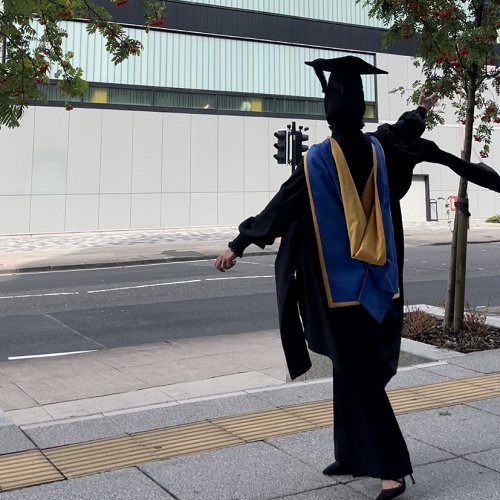Tell us a bit about your background…
I am a Saudi girl who loves languages and the process of learning a new language. I studied English language for my Bachelors degree which I was really passionate about, and graduated within five years with honours.
What inspired you to study MSc TESOL & Intercultural Communication?
I really enjoyed studying the English language for my Bachelors degree and my aim was to get an MSc in TESOL to help me to pursue my ambition of becoming a lecturer in a prestigious higher education institution teaching the language.
Why did you choose to continue studying at the University of Strathclyde?
I chose the University of Strathclyde as it is ranked the top 5 for TESOL in the UK, and also because it is located in Glasgow, a charming city, as well as that the full-time Masters programme takes just one year which suited my circumstances.
What has been the highlight of your time with Strathclyde so far?
I really was amazed by how professional and organised the online platform was. I also liked the talented teachers and their respectful attitude towards students. I also admired how passionate they were about their specialist subjects. I felt that they wanted us to do really well in the programme and enjoy our studies.
What specialist knowledge/professional skills have you developed whilst studying the course?
I noticed that my writing skills developed significantly during the course because of the work that went into the assignments and dissertation. I also developed my teaching skills, which were limited before joining the programme. This was due to the teachings from both modules I was studying and through the observation of my lecturers' styles of teaching.
What would be your advice for people considering taking this course?
Let your motivation lead you to success, don’t be driven by anxiety, you will achieve the same results.
Enjoy your journey, your mental health matters.
What have been the main challenges studying at postgraduate level?
Prior to joining the programme I had limited academic writing experience, so I had to work hard on my academic writing skills to do well on my assignments and dissertation. Meaning, I had to spend time and effort to learn and search for academic writing lessons and trying to understand what is needed from each assignment in order to start writing.
What do you think of the support available?
I was really satisfied with the support given by the University. Due to COVID, the University was very supportive when I requested an extension on a deadline. There are a lot of support teams available at the University such as the Disability and Wellbeing service. They help students who need some extra assistance. There are English language teaching courses for students who need to develop their English language and many more support teams available. I didn’t have to use these services but knew that they were available if I ever did.
What are your ambitions for the future?
My ambition for the future is to be a great lecturer who can deliver lessons to students effectively and efficiently. The topic of my dissertation was the effectiveness of blended learning and this will help me to use technology when teaching because of its effectiveness on students’ motivation, satisfaction, and learning achievements. Also, I want to be the resaon that students enjoy English language learning, and I am going to do my best to do a PhD in the field of TESOL.
